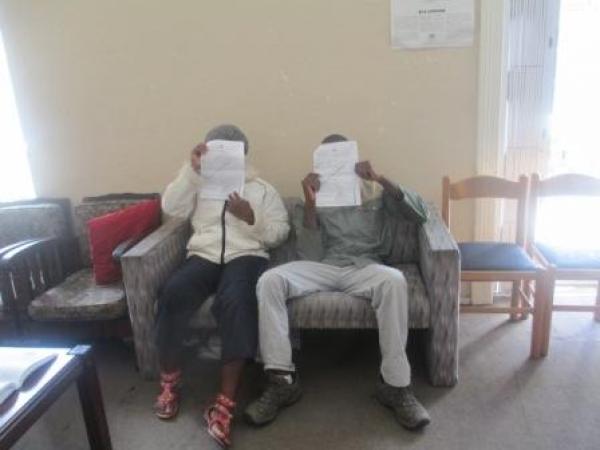Tried twice for expired asylum papers: bureaucratic nightmare for Zimbabwean farm workers

The hardships and inconsistencies of the South African refugee system are illustrated by what has happened to Zimbabwean asylum seekers who work on a farm near Vanwyksdorp, a tiny rural town in the Western Cape, more than four hours drive from Cape Town, that is only served by gravel roads.
First their farm was raided by police and immigration officers. During the raid they were arrested for having expired asylum documents. Then they waited in prison for eleven days, charged with violating the Refugee Act, before their case was heard by the Ladismith Magistrates’ Court on 19 November (Ladismith is the nearest town to Vanwyksdorp with a court). The magistrate instructed the five men and two women to pay a fine and renew their asylum papers before appearing in court again on 2 December. They were released on free bail in the meanwhile and given court documents to show to Home Affairs.
So the seven travelled to Cape Town to renew their documents.
On 21 November, the Cape Town Refugee Centre turned them away without renewing their asylum papers apparently because they could not understand the documents that the Ladismith Magistrate Court had given them
After they were turned away by Home Affairs they went to People Against Suffering and Oppression (PASSOP) for assistance. Seeing the confusion emanating from Home Affairs, PASSOP advised them to go back to Home Affairs to explain that their documents had expired.
This the refugees did, except Home Affairs officials, instead of renewing their asylum papers, ordered them to appear before a Cape Town magistrate on 22 November. Almost exactly as the Ladismith magistrate did, the Cape Town magistrate ordered the seven to pay their fines and renew their documents.
Anthony Muteti of PASSOP says it is absurd. He says that Home Affairs should have let the refugees pay a fine and renew their documents since they had already been charged in the Ladismith Magistrate Court for the same offence.
Muteti says, “Home Affairs’ way of dealing with refugees is complicated and long. These refugees have been staying at PASSOP offices for three days. One of the refugees has a three-year-old child. She came unprepared. She did not know they would end up sleeping at PASSOP offices.”
“Officials at the Cape Town Refugee Centre either don’t know how the Refugee and the Immigration acts work or they deliberately chose not to know. The refugees were suppose to be served the first time they showed documents from the court. What they [Home Affairs] did is in contradiction of [both] the Immigration and the Refugee Act, which complement each other.”
“Officials at the Cape Town Refugee Centre either don’t know how the Refugee and Immigration acts work or they deliberately chose not to know.”
Muteti says, “Home Affairs knows refugees from areas like Vanwyksdorp are uninformed, which is why they go and raid them, taking advantage of their circumstances. It is very difficult for people who stay that far away to come and renew their documents every three months.”
One refugee said his asylum expired on 7 July 2012. When he went to Maitland to renew his documents, there was no sign that Home Affairs had relocated to the Foreshore offices. So he returned to his farm.
Muteti says, “Home Affairs should be visible. Even Capetonians do not know where Customs House is.”
Two of the refugees arrived in Cape Town after Home Affairs had stopped giving permits to new applicants. They are therefore undocumented. They have now gone to Durban Home Affairs to apply for asylum documents.
One refugee told GroundUp that on the day of the arrest, they were busy hauling poles from a field to a scrap yard, when a driver came to collect all Zimbabweans. When they arrived at the farm, Home Affairs officials were waiting for them, and asked to see their work permits.
“We do not understand how Home Affairs came to know that our documents are invalid. We believe someone tipped them off.”
One refugee said being in prison was traumatising. They were intimidated by gangs. They had to take turns sleeping to protect each other. A prison gang leader searched them on the first day and demanded they give him their best shoes and clothes. When security asked if they had any complaints, they were too scared to report the incident.
Home Affairs, as has unfortunately become quite usual, failed to respond to GroundUp’s queries.
Support independent journalism
Donate using Payfast

Don't miss out on the latest news
We respect your privacy, and promise we won't spam you.

This article is licensed under a Creative Commons Attribution-NoDerivatives 4.0 International License.
